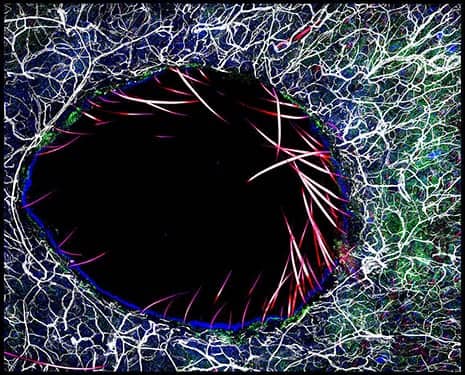
Pictured here is an immunofluorescent image of immune cells surrounding a skin wound, enriched in the beneficial bacteria S. epidermidis. (photo courtesy of NIAID)
Bacteria on the skin of lab mice work with the immune system to defend against disease-causing microbes and accelerate wound healing. Determining the same mechanisms in humans could help inform wound management techniques, NIH scientists suggest.
This research, from scientists at the National Institute of Allergy and Infectious Diseases (NIAID), part of the National Institutes of Health, was published recently in Cell.
In the study, the researchers—led by Yasmine Belkaid, PhD, chief of the Mucosal Immunology Section of NIAID’s Laboratory of Parasitic Diseases—observed the reaction of mouse immune cells to Staphylococcus epidermidis, a bacterium regularly found on human skin that does not normally cause disease. To their surprise, immune cells recognized S. epidermidis using evolutionarily ancient molecules called non-classical MHC molecules, which led to the production of unusual T cells with genes associated with tissue healing and antimicrobial defense. In contrast, immune cells recognize disease-causing bacteria with classical MHC molecules, which lead to the production of T cells that stoke inflammation.
Researchers then took skin biopsies from two groups of mice—one group that had been colonized by S. epidermidis and another that had not. Over 5 days, the group that had been exposed to the beneficial bacteria experienced more tissue repair at the wound site and less evidence of inflammation, explains a media release from the National Institutes of Health.
In further research, the team plans to probe whether non-classical MHC molecules recognize friendly microbes on the skin of other mammals, including humans, and similarly benefit tissue repair. Eventually, mimicking the processes initiated by the microbiome may allow clinicians to accelerate wound healing and prevent dangerous infections, the researchers note, per the release.
[Source: National Institutes of Health]

